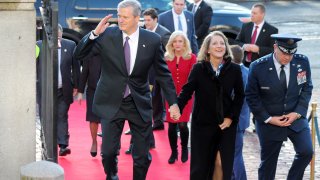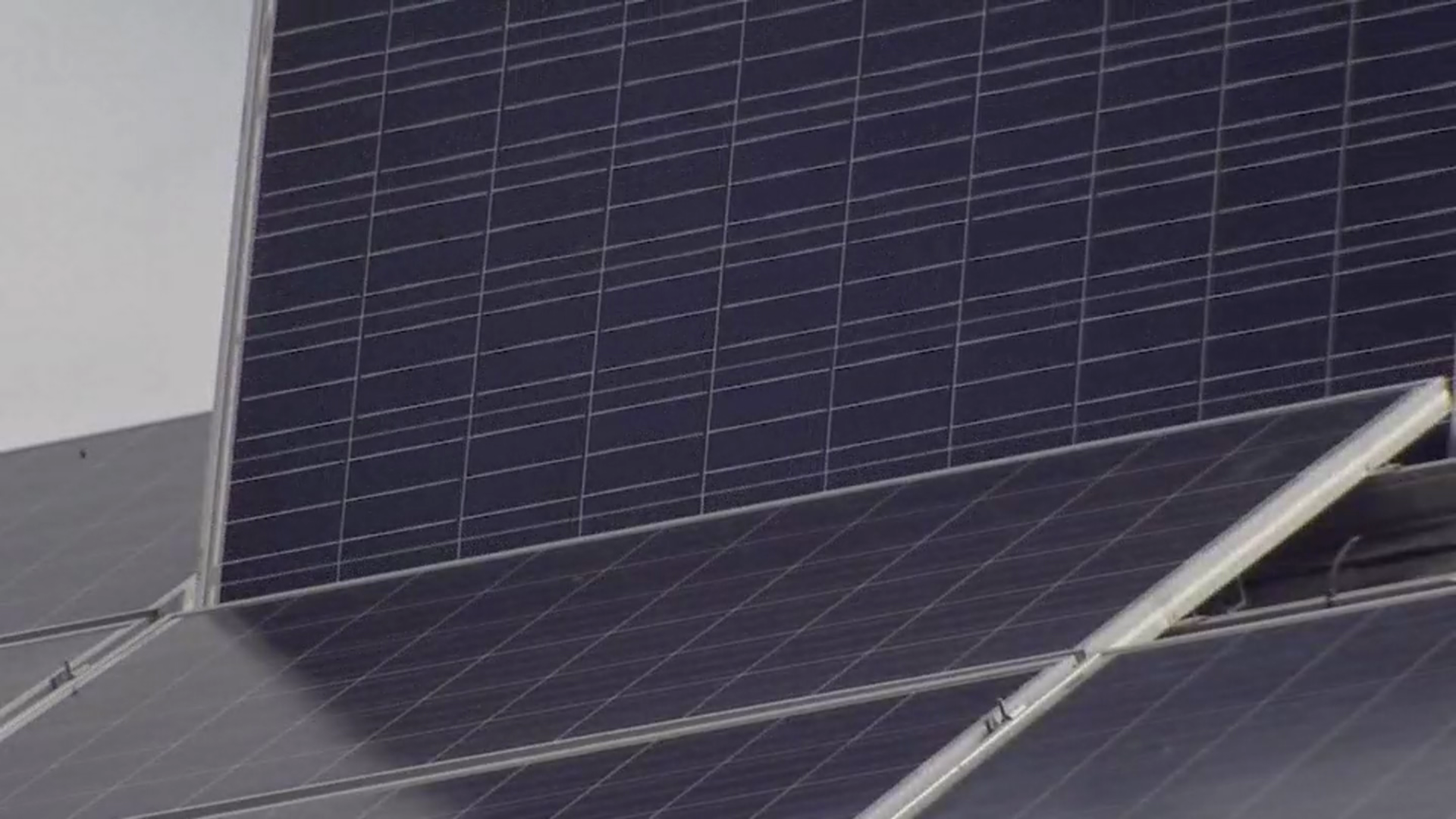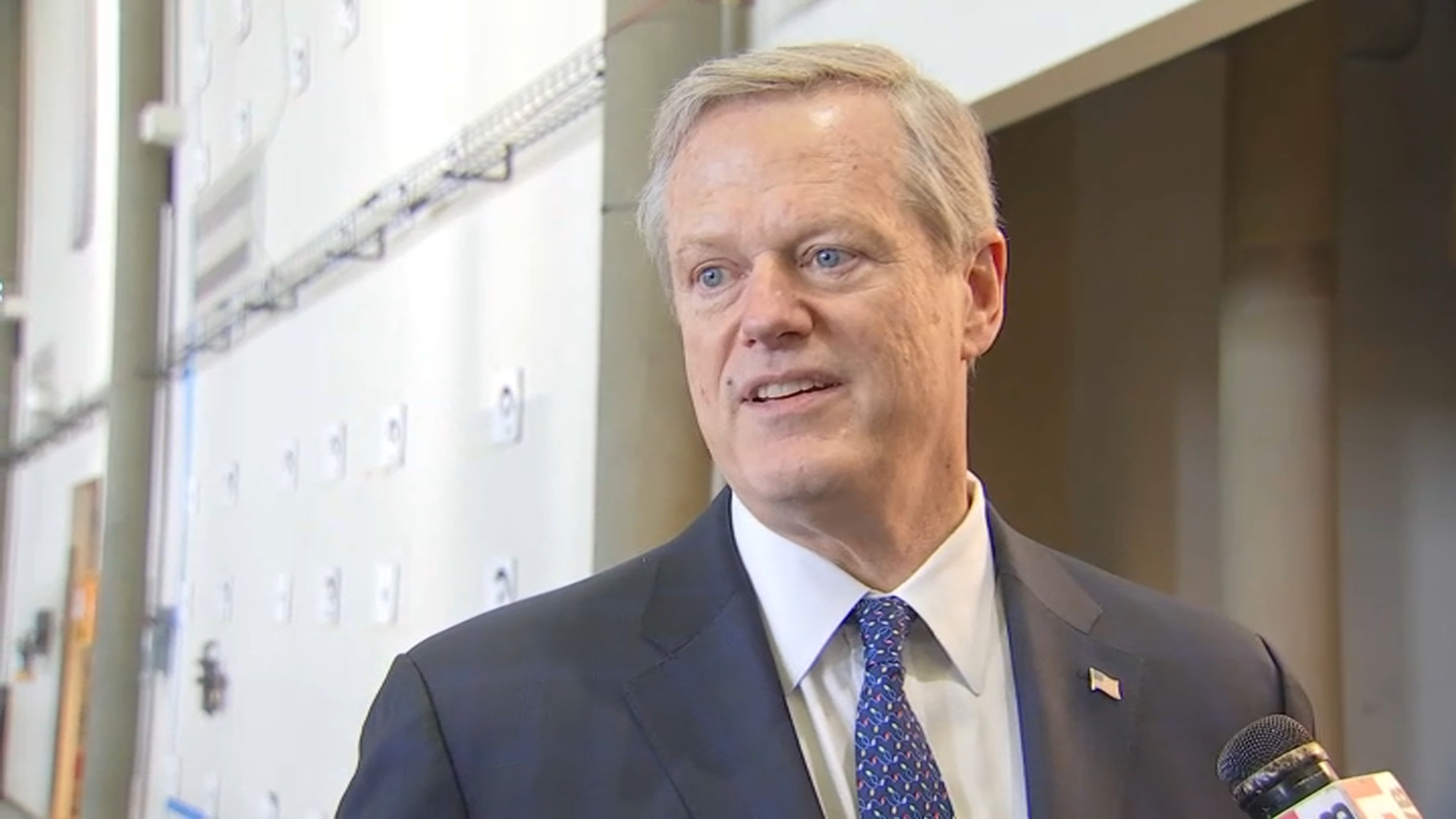
Next week, Charlie Baker will take his lone walk out of the executive office suite where he has worked as governor for the last eight years, through a State House that he has roamed for much of the last three-plus decades in various capacities, and back into civilian life.
So how does Baker, the two-term Swampscott Republican often credited with being the nation's most popular governor, want to be remembered? Given the opportunity during an exit interview Tuesday, Baker told the News Service what he would write as his "who clause" in future coverage.
As in: Gov. Charlie Baker, "who left office far more popular than he was when he was originally elected and worked on a bipartisan basis with his colleagues in state and local government on a series of initiatives that brought closure to many issues that had been outstanding for years, such as broadband in Western Mass., South Coast Rail and the [Green Line Extension] project, the reform of Bridgewater State Hospital, and a series of important pieces of legislation to enhance the commonwealth's ability to educate both its young people and its workforce," will officially leave office Jan. 5 and make way for Gov.-elect Maura Healey and Lt. Gov.-elect Kim Driscoll, both Democrats.
"The other thing I would say that I do think is part of our legacy is this idea of trying to create a city-state relationship, a community-commonwealth relationship, a local municipal-state government relationship that is positive and forward-looking and collaborative," Baker said. "And I do believe that that one is legit and will be sustained. It'd be very hard at this point to change that one. And I think the fact that the next lieutenant governor spent 16 years as a mayor is going to help a lot on that."
Get Boston local news, weather forecasts, lifestyle and entertainment stories to your inbox. Sign up for NBC Boston’s newsletters.
Baker's two terms as governor saw the state budget shift from a structural deficit to a surplus so large that the state by law had to give nearly $3 billion back to taxpayers. He managed the state through the first pandemic in a century, holding nearly-daily briefings on a virus that few people understood and promoting vaccinations that have helped the economy rebound.
Under Baker, Massachusetts began its most serious pursuit of clean energy like offshore wind, Bay State schools gained a new funding scheme, all seven justices of the Supreme Judicial Court were appointed and confirmed, and tollbooths on the Mass. Turnpike became a thing of the past.
He also leaves office with the MBTA operating at a reduced level and with the cloud of a federal safety investigation hanging over it. The opioid overdose crisis, fueled by the emergence of fentanyl, has proved to be a persistent problem, and state spending has soared along with tax revenues and federal aid.
Baker adroitly sidestepped a question about his administration's greatest failures, but pointed to a handful of loose ends that he will be leaving. He said he is happy to hear Healey talk about wanting to invest in clean technology as a way to help Massachusetts meet the net-zero-by-2050 commitment that he supported.
"I mean, we tried twice to get the Legislature to do something significant in this space. I personally believe that to get to where we need to go by 2030 and 2050, it's going to be as much about innovation as it is about coercion. And I believe that we have the brainpower and the skill set to play a huge role in the next act on all things clean energy," Baker said. "And I'm sorry I wasn't able to make the sale on that. I deeply regret that."
He added, "I also wish we'd gotten that dangerousness bill and the revenge porn stuff done," referring to a package that he filed in three consecutive sessions without getting the Legislature on board, most recently by unsuccessfully trying to tie the idea to a budget rider making phone calls free for incarcerated people and their families.
Executive-Legislative Relations
Despite a handful of examples like his dangerousness bill, the Republican Baker enjoyed a largely positive and fruitful relationship with the House and Senate, each with its own Democrat supermajority, during his eight years in office.
"They have a job to do, we have a job to do. I think it's better for both of us if we spend less time arguing about small stuff and focusing instead on debating and discussing larger items and issues," Baker said, adding that the Monday afternoon leadership meetings that were more common pre-pandemic "were really effective."
The decision about how to approach the give-and-take between his administration and the Legislature was "not a complicated one," Baker said, because he was part of that dynamic during his time working for Govs. William Weld and Paul Cellucci in the 1990s.
"The Weld and Cellucci folks were pretty good about letting their Cabinet secretaries just go talk to the Legislature. Paul came out of the Senate, so he had a certain trust in the institution to begin with, and Governor Weld was kind of the same way just by virtue of who he was," Baker said.
He added, "So we came in, we basically said to the Legislature and to our Cabinet secretaries, you know, talk to each other. I remember having a conversation with one member of the Legislature who had been around for a long time. And he said, 'So this is like no chaperones-type meetings?' And I said, 'No, no chaperones. You want to talk to somebody, just call them up.' And I do think that people appreciated that and I think it made a difference ... We wanted people to make sure they let us know what they were talking about after they met so that we had some idea about what the messaging was like, but the whole idea that you would try to quote-unquote heavily manage that just seemed like a bad idea to us."
Despite the partisan differences, Baker and the Legislature often sang in harmony.
"It has been nice, it has been nice to feel respected, it has been nice to feel engaged -- and he wants to be engaged as all of his secretaries. It just makes me feel good that -- I'm going to say something really crazy but -- there's no Democrat or Republican," Rep. Patricia Haddad of Somerset, a Democrat who served as House speaker pro tempore, said in 2017.
Baker this week attributed some of the rosiness of the relationship between his administration and the Legislature to "tone and attitude, and some of it's about substance, and some of it's about just how it works."
He pointed to the 2020 policing reform law, which created the Peace Officer Standards and Training Commission, as "the issue on which this played out in the most positive way under some of the most difficult times."
"We're one of the few states that actually did something significant. Part of the reason we did something significant in the aftermath of all the horrors of the summer 2020 was we had been discussing and debating this issue with the Black and Latino Legislative Caucus for a while. We had a bill that was almost ready to go when the pandemic started; we filed it in June with their support. The House and the Senate were both interested in moving on it. They got something through both branches and to us that we didn't love, and we tried to send them back something we thought we and they could live with, not something that was designed to make it difficult to get to yes. And then even then we still had the votes to sustain a veto in the House, if we had chosen to," the governor said. He added, "The debate that we had was an honest and open one, and it wasn't quite the high-wire thing it was in a lot of other parts of the country. And I thought it was a really great example of how that constructive friction idea, particularly if people have been building trust with each other anyway ... I think that matters."
A Different Era on Beacon Hill
It was in December 1990 that Baker was introduced by Gov.-elect Weld as "undersecretary of human services specializing in health matters." Through the 1990s, he had an up-close look at the job of the governor and how state government operated as a key member of the Weld and Cellucci administrations.
By the time he became governor himself in January 2015, things had changed.
"Back in the day, the day would start with everybody going through the morning print-out and copy of all the news stories from the night before. Which, obviously, doesn't happen anymore. I mean, the whole news cycle is completely different than it was then," Baker said. He added, "The 24/7 news cycle almost by definition changes the nature of the job [of governor] ... I think the job is probably a little more, a little more constant. I mean, one of the reasons I didn't run for a third term was just my wife and kids were kind of sick of the fact that I was just not present very much. Again, the pandemic as an overlay on this changes a lot of this stuff."
Even the way a governor's day is structured has changed with the times, Baker said. Weld and Cellucci used to make lots of decisions at morning meetings in the governor's office. But in the Baker administration, "We don't really have a morning meeting like that," he said. Instead, Baker would talk to his chief of staff at 6:30 a.m. each day and the chief would then have some type of morning meeting or muster with staff.
"We had Cabinet meeting every Friday until the pandemic, then it went virtual. And now it's kind of one week virtual, one week in person. But I've tried to make that Friday Cabinet meeting sacrosanct because I think it's important that all of us are talking to each other once a week about whatever's going on," Baker said.
Even before the COVID-19 pandemic changed the way almost everyone in and around state government works, Baker said the day-to-day work of Beacon Hill had become less about face-to-face meetings and physical presence.
"You dealt with a far more present media in the old days than you deal with -- physically present -- than you deal with now. And, you know, every paper had somebody in the newsroom and I can still remember who the people were," he said, rattling off a list of reporters and their affiliations. Baker added, "Physical presence was everything back then. And so almost everything took place in physical presence. You know, phones were on people's desks, they weren't in their pockets."
Along with "just a lot more personal vibe in the building generally," Baker said, it "was usually a pretty big deal" when the governor or Cabinet secretaries would travel around the state to visit people in their own communities.
"I would argue one of the things the lieutenant governor and I tried very hard to do is to pursue a 1990s strategy around physical presence. Both of us spent a lot of time out of the building, out of the State House, out of the office, visiting with people in their communities," he said. "We tried to turn the message about state government and local government from 'local government's a problem' to 'local government's a partner.'"
An Eventual Return
After about two months of post-governorship down time, Baker in March will start his new job as president of the NCAA.
But there is likely to be at least one more Baker-centric event at the State House at some point in the future. Once it is finished, a portrait of Baker will join those of the governors who preceded him on the walls of the lobby to the executive suite. For other governors, the portrait unveiling event has served as an administrative reunion of sorts.
"I sat for it," Baker said Tuesday of his portrait. "I don't know when it will be finished, I really don't. I think it's going to be a while."



